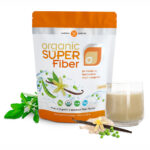Detox your Digestive System for Better Health and Well-being
Detox your digestive system to maintain intestinal health and enhance overall well-being. This process involves cleansing the intestines of accumulated toxins, bacteria, and other waste products that can build up over time.
Digestive detox can help improve digestion, reduce inflammation, boost the immune system, and even help with weight loss. By understanding these benefits and knowing how to properly cleanse the digestive system, we can be on our way to a healthier lifestyle.
In this article, we will see the great importance of detoxification of the digestive system for better health and well-being.
Este artículo también está disponible en Español
What is the Gut Microbiome and how does it affect our health?
Our intestines have an extended surface of between 250 and 300 square meters, which is similar to a tennis court. They represent our body’s largest area of contact with the environment and therefore play a very important role as the first defense barrier against the entry of pathogens, toxic elements, and other harmful materials.
The intestinal mucosa is covered by a protective layer formed mainly by epithelial cells known as “enterocytes”, which are responsible for the absorption of essential nutrients, and the transport of water and electrolytes within our body.
This layer of intestinal mucus is covered by a complex ecosystem of bacteria, fungi, and other microorganisms that live in the gastrointestinal tract, which is known as the intestinal microbiota or microbiome, and that plays a beneficial role in our body. Beneath the microbiota, at a more internal level, there is a layer of immunoglobulins A, which serve as protection and defense.
What role does the Gut Microbiome play?
The gut microbiome, also known as gut flora, plays an important role in maintaining the overall health and well-being of our bodies by helping to digest food, remove toxins from the body, and support the immune system. Let’s see more details of these functions:
The Metabolic Function of the Gut Microbiome
Beneficial bacteria in the intestinal microbiome play a crucial role in metabolizing carbohydrates and other nutrients that our intestines cannot digest. These bacteria assist in digesting proteins, breaking down lipids, and fermenting polysaccharides obtained from dietary fiber.
Additionally, they are involved in the production of vitamins such as K, B6, B12, folic acid, B1, and B2, and they enhance the absorption of calcium, magnesium, and iron. Furthermore, these bacteria help reduce cholesterol and oxalate levels in the intestine and participate in the metabolism of drugs and xenobiotics.
Protective role of the Gut Microbiome
The microbiome or intestinal flora prevents the colonization of the digestive tract by other pathogenic microorganisms, through the production of bacteriocins, the induction of immunoglobulin A, or simply by occupying the place where said microorganisms could be located, winning the competition for ecological space.
A normal intestinal microbiota constitutes a protective barrier against pathogens thanks to the space it occupies, its ability to secrete antimicrobial substances, and the acidification of the medium by secreting organic acids. In addition, it promotes the health of the intestinal barrier by strengthening the intercellular junctions of the intestinal wall.
The Gut Microbiome and the Immune Function
The digestive tract is the largest immune organ in our body. Our intestines represent our body’s largest area of contact with the environment and therefore play a very important role as the first defense barrier against the entry of pathogens, toxic elements, and other harmful materials.
Our intestines produce approximately 80% of the immune cells in our body and maintain a constant bidirectional interaction with the intestinal microbiome to favor its maturation and promote its most suitable composition.
Signs of an Unhealthy Gut
An unhealthy gut can cause a wide variety of symptoms and health problems. It is important to be aware of the signs that may indicate an unhealthy gut so that you can take appropriate action and prevent further damage.
Understanding the signs of an unhealthy gut allows us to take early action to improve our overall health and well-being. These symptoms often occur together, but too often we ignore them until they become a deeper problem. Next, we will look at the most common signs of an unhealthy gut that we should not ignore.
Upset Stomach, Gas, and Bloating
Gas, bloating, cramps, and intestinal discomfort are the most frequent symptoms of an unhealthy intestine. These symptoms are present in any problem related to the digestive system, including indigestion, irritable bowel, leaky gut, imbalance, or bacterial overgrowth.
Many times we attribute these problems to the food we eat, stress, or our state of mind, and although these can be the cause of intestinal problems, intestinal problems often have a deeper origin.
Food Intolerances
Food intolerance is an adverse reaction of the body to the consumption of certain foods. It is generally due to the deficiency of a digestive enzyme, the presence of toxins or medication contained in food, or other elements that the digestive system cannot digest.
The most common forms of food intolerance are lactose intolerance, gluten intolerance, fructose, and sucrose intolerance. Because food intolerance can often go unnoticed, many people may suffer from food intolerance without knowing it. The most frequent symptoms of food intolerance are inflammation, stomach pain, vomiting, diarrhea, gas, and skin rashes.
We must not confuse food intolerance with allergy, since the latter is accompanied by a strong immune response when our body mistakes a beneficial food or component as a threat to the body and reacts to attack and eliminate it. Allergies cause different reactions hives, inflammation, and difficulty breathing, and can be very dangerous to health.
Sometimes, gluten intolerance can cause immunological reactions, in which case they become allergies and must be treated with great caution. In any case, be it intolerance or allergy, a doctor should be consulted to identify the recommended steps to follow in the situation.
Constant Fatigue
When our intestine does not work properly, we have difficulty absorbing nutrients from food. A nutrient deficiency leads to constant fatigue that is not resolved with rest.
Constant fatigue can also be due to a leaky gut, which is what happens when the lining of the intestinal wall allows toxins and bacteria to enter the bloodstream, leading to inflammation. Recent studies show inflammation in the blood of patients with this problem.
However, the unhealthy gut is accompanied by other additional symptoms, such as those mentioned above, so if the fatigue symptom occurs without being accompanied by other symptoms, we most likely have to look for the cause outside the intestine.
Mood and Difficulty Sleeping
Serotonin, known as the “happiness hormone,” is an important neurotransmitter in the central nervous system and enteric nervous system, which is responsible for direct control of the digestive system.
95% of serotonin is produced in the intestine. Intestinal bacteria produce short-chain fatty acids, which promote the production of serotonin. This is why an unhealthy gut microbiome can affect the production of serotonin levels.
Having insomnia or mood problems could be another warning sign of an unhealthy gut due to impaired serotonin production.
Skin Problems
Gut dysbiosis occurs when there is a constant bacterial imbalance in the intestinal flora. Gut dysbiosis triggers an inflammatory immune response. Skin problems such as eczema, psoriasis, acne, and skin rashes are frequent signs of unbalanced gut flora. We can also observe these skin disorders when we have a leaky gut.
Autoimmune Disorders
In addition to helping to digest difficult-to-digest food components and providing nutrients and vitamins to our body, the intestinal microbiota contributes to the development of immunity. When we have an imbalance of the gut microbiome, the gut microbiome can promote autoimmune diseases through its effect on white blood cells, which can attack healthy tissues.
Autoimmune diseases produce inflammation and pain, among other symptoms, which in this case may be related to unhealthy bowel problems.
Changes in Body Weight without reason
Gut health can affect the body’s ability to absorb nutrients, regulate blood sugar, and store fat. These imbalances can cause weight gain or loss for no apparent reason.
Weight loss can occur when there is an abnormal increase in bacteria in the gut microbiome, leading to diarrhea and difficulty absorbing nutrients. On the other hand, weight gain can be caused by the need to overeat to compensate for the lack of nutrients, or by insulin resistance caused by the overgrowth of microorganisms with greater efficiency in obtaining energy.
How to Detox your Digestive System in 6 Simple Steps
Detoxifying our digestive system is a great way to improve overall health and well-being. It can help us eliminate toxins, reduce inflammation, and improve digestion.
Let’s look at five simple steps we can take to detox your digestive system in no time. We’ll discuss which foods are best for a detox diet plan, which foods to avoid, and what other simple actions can help us improve our gut health.
1- Drink Enough Water
Drinking enough water every day helps keep us hydrated and is an excellent aid to digestion. Water also helps us to eliminate toxins and waste material more easily.
We can also add foods with high water content to our diet. This includes fruits and vegetables like watermelon, strawberries, grapefruit, cantaloupe, lettuce, tomato, cucumber, and celery.
2- Add Friendly Foods for the Digestive System to your Diet
Add high-fiber foods such as legumes, vegetables, oats, fruits, nuts, and seeds to your diet. Some fibers, known as prebiotics, can be food for beneficial bacteria in the intestinal flora. Other types of fiber cannot be digested by our digestive system and move through the digestive tract helping food pass faster and avoiding constipation.
Also include anti-inflammatory foods, such as green leafy vegetables, berries, oily fish, garlic, onion, spices such as ginger and turmeric, nuts, and olive oil. They not only help us improve intestinal function, but also keep detoxification pathways healthy.
Eat fermented foods like yogurt, kefir, kimchi, and sauerkraut. Fermented foods are an extraordinary source of probiotics, which are bacteria that have been shown to have a beneficial effect in promoting a healthy gut microbiome. Probiotics can also be found in prepared nutritional drinks.
3- Avoid Foods that damage the Intestinal Flora
Many common foods in our daily diet are harmful to intestinal flora, and we must avoid them to improve our health. Processed foods and meats, grains and refined flour, foods with gluten, foods with a lot of fat, sugar, alcohol, artificial sweeteners, and sugary soft drinks, are detrimental to our intestinal microbiome.
4- Eat the Right Way
We rarely pay attention to the way we eat. On many occasions, we tend to take food at full speed, rushed by the busy daily routine. Possibly we have prepared the next bite before swallowing the one we have in our mouth, and surely, we do not chew it completely.
The habits that we have established in our daily eating routine have a significant impact on digestion, and many times we end up with a bloated feeling in our stomach that accompanies us for the rest of the day, and we do not realize what the reason is for it.
We must pay attention to the way we eat, beginning by relaxing before starting to eat. Putting aside the problems of the day, breathing slowly, and becoming aware of the process that you are going to start, allows your digestive system to prepare itself properly.
While eating, adopt healthy habits such as chewing food slowly and completely, pausing between bites, taking small portions with each bite, eating sitting upright, eating only the necessary amount of food without excesses, and avoiding eating very close to bedtime. At least you should eat at least 2 hours before going to sleep, but at least 3 hours before is recommended.
5- Control your Stress Level
Stress affects digestive function through communication between the brain and the digestive system. It can cause alterations such as intestinal permeability, visceral motility and sensitivity, blood flow, and intestinal mucosa secretions. Stress also impacts the composition and habitat of the gut microbiome.
The most frequent digestive disorders associated with stress are leaky gut syndrome and irritable bowel syndrome. Under these conditions, people experience overstimulation of the sympathetic nervous system and high levels of cortisol in the blood. Increased intestinal permeability alters the gastrointestinal barrier, allowing toxic substances and macrophages to pass into the bloodstream instead of being blocked and eliminated with the feces.
These disorders trigger an immune response, leading to inflammation of the intestinal mucosa and other possible undesirable consequences in different parts of the body.
6- Move your Body
Practicing exercise regularly helps to minimize the problems derived from poor digestion. Physical activity strengthens the abdominal muscles and stimulates the intestines, helping to move food as it passes through the digestive tract, thus helping to regulate bowel habits and reduce constipation.
It also helps us combat stress, which is one of the main causes of discomfort and digestive problems. Physical exercise reduces cortisol levels, the stress hormone, thereby helping to improve intestinal function.
READ OUR PRODUCT REVIEW:
Improve Your Digestion, Metabolism, and Gut Health
If you want to learn more about our best choice of fiber supplement, check out this honest and detailed review of Organic Super Fiber by Touchstone Essentials. This product contains a blend of prebiotic fibers that can nourish your good bacteria, support your immune system, and help you feel fuller for longer. Click here to read our review and find out how you can get this amazing product for yourself.
Wrapping Up: Detox Your Digestive System for Optimal Health
Our digestive system, in addition to overseeing absorbing the nutrients that our body requires, constitutes our body’s greatest defense barrier against toxic and harmful external agents. Maintaining a healthy digestive system is vitally important to our overall health.
In digestive health, the gut microbiome plays an essential role. The proper balance of beneficial bacteria is crucial for optimal health. Fortunately, we can take a few simple steps to detox your digestive system, improve our gut microbiome, and enhance our well-being.
Eating the right foods and taking the right supplements can help improve our digestion, reduce inflammation, and support overall gut health. Probiotics, fiber supplements, digestive enzymes, and prebiotic supplements are supplements that we can take to support digestive health, restore the balance of intestinal flora, and improve digestion.







